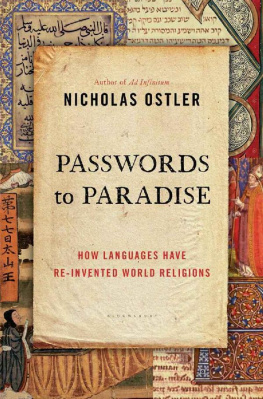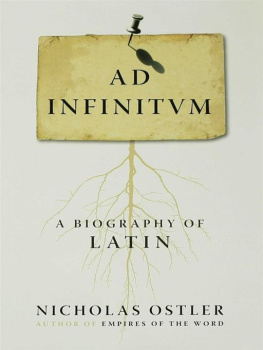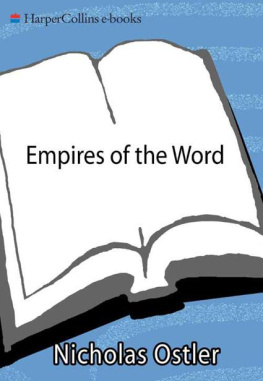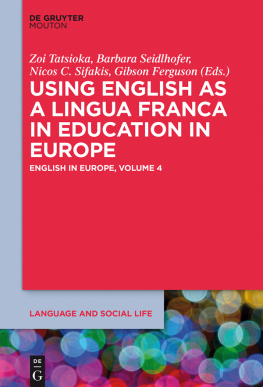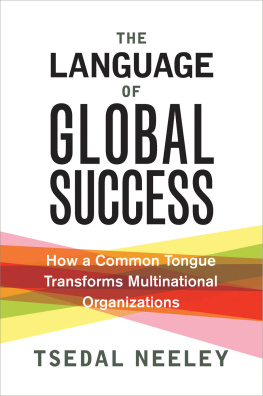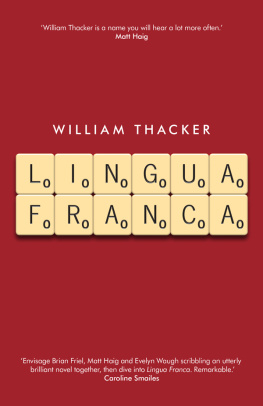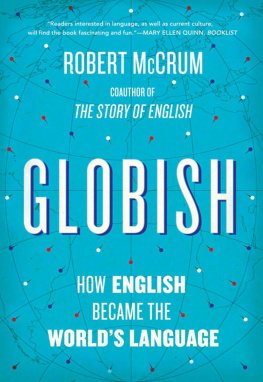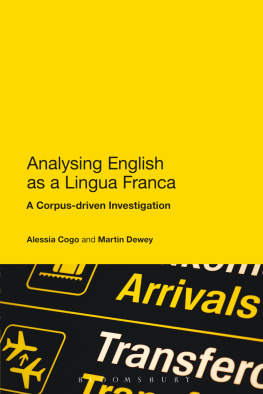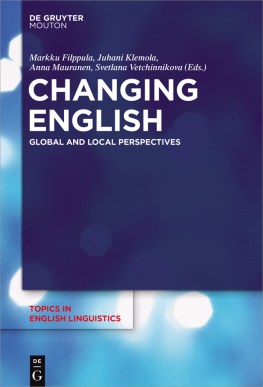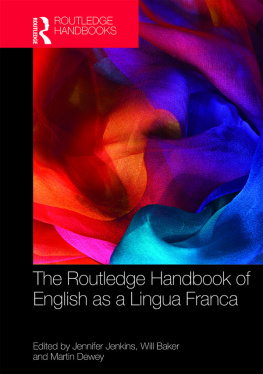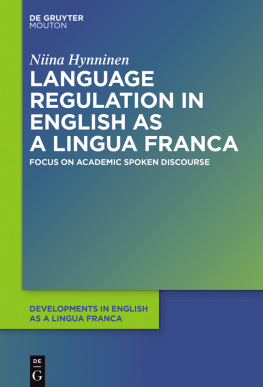Ad Infinitum: A Biography of Latin
Empires of the Word: A Language History of the World
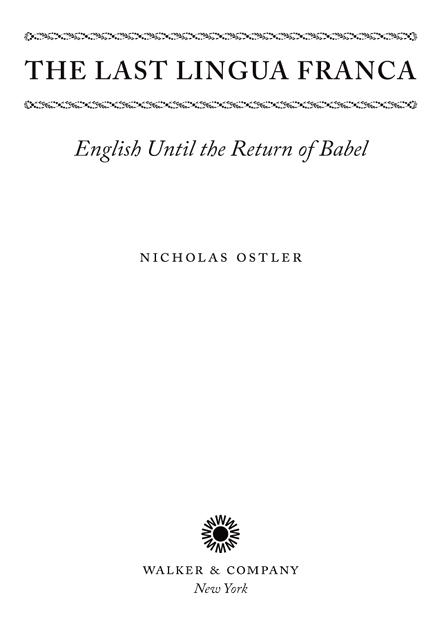
To Steve,
the Master.

Wer fremde Sprachen nicht kennt, wei nichts von seiner eigenen.
He who is not acquainted with foreign languages knows nothing of his own.
Goethe, Maximen und Reflexionen
Contents
I benefited early from the antiquated grading system at my prep school. At Yardley Court in Kent in the 1960s, performance either in Latin or in French Englishs two predecessors as a global lingua-franca was as highly prized as expertise in mathematics, or all other subjects (including English) combined. Studies associated with English were seen somehow as free extensions of growing up with this mother tongue, combined, and so undervalued. This bias suited my own talents just fine.
Perhaps as a result, I never shared in the local reverence for the special beauties perceived in the language that the English (and in fact the lowland Scots) have given to the world. What can they know of English as a language, who only English know, after all? But evidently, without the predominance of English, this book would not exist; nor would I, in all likelihood, be able to subsist on writing such things. My First acknowledgment, then, must go to the English language past and presentwhich means the collaborative speech community that has spoken it, and made it available, and ever more widely useful and even attractive, these last fifteen centuries.
After that I must confess comparable, and rather more sincerely felt, indebtedness to so many other languages that had previously developed into lingua-francas. Curiously many in this book have initial P Phoenician, Persian, Pali, Portuguese, and various pidgins and a few more initial S Sanskrit, Sogdian, Syriac, and (at a pinch) sermo Latinus. But there have been so many more. Once again, a language principally means the community of people that have been moved to speak it. As a good friend of mine once enthused over the existence of so much good music from Hildegard of Bingen even unto Andrew Lloyd Webber, so I feel a bubbling up of joy at the thought of so many good languages. Blessings upon their diversity!
More specific human debts are much plainer. My agent Natasha Fairweather accepted my curious ideas and conveyed them with added charm to hard-headed but (let us hope) perceptive publishers, George Gibson at Walker & Co. and Will Goodlad at Penguin. At Walker & Co., Jackie Johnson and Mike OConnor have worked valiantly with an intricate manuscript.
Before and while writing it, I have learned much from Harold Schiffman and assembled sages, especially Birgit Schlyter, at the UPenn symposium in 2001 on Languages in and Around Afghanistan; later, the library at London Universitys School of Oriental and African Studies was fundamental to progress. From Douglas Streusand I learned of the military organization of the Mughals, from Ian Bradley of British missions and hymns, and from Eisel Mazard and Ken Kawasaki of the Pali tradition, ancient and modern. Various written works by Wheeler Thackston and P. Oktor Skjrv have inducted me into the history of Iranian languages. None, of course, are responsible for what I have made of what I think I have learned. Hakim Elnazarov, ably arranging the conference for the Foundation for Endangered Languages in Tajikistan in 2009, allowed me to see some of the modern reality in the valleys where Sogdian and Tajiki have long been spoken.
Other stimuli for useful thinking, largely about the future of English, have come from John Timpane at the Philadelphia Inquirer, Elisabeth Eaves at Forbes.com, Harry Somers and Llus Mrquez at the European Association for Machine Translation, and Richard Ishida at the Unicode Consortium. Koos du Toit and Hermann Gilliomee at Stellenbosch, Henry Thipa and S E Ngubane at Port Elizabeth, Wynn Chao at SOAS, Salikoko Mufwene and William Wimsatt at the University of Chicago, and John Alcorn at Trinity College Hartford have all generously provided invitations, and discussions with students and faculty, that have had an impact here.
I thank Eisel Mazard for his beautiful renditions of some Southeast Asian scripts in chapter 6. I wish there had been scope to display more of them.
My wife, Jane, and daughter, Sophia, and many more in my ever-sprouting wider family, have supported and encouraged this work throughout. Other friends, notably David Nash and Jane Simpson, have drawn my attention to curiosities in odd corners of the world, as well as offering laconic comment on the passing show.
The book as a whole I dedicate to my elder brother Steve, who as a budding scientist was less well served by Yardley Courts idiosyncrasies. The early rivalry I had with him is the good earth from which the dogged, but I hope truthful, perversity of my thesis here has sprung. He came to the First languages I learned before I did, and shaped many of my thoughts about them before I knew a single foreign word. Like me he is a determined language learner when he chooses to be. As he crosses the brook to our seventh shared decade, his steadfast resilience and technical originality still leave me gasping. This is his tribute from Linguistic Nic.
The Moving Finger writes; and, having writ, Moves on: nor all your Piety nor Wit Shall lure it back to cancel half a Line, Nor all your Tears wash out a Word of it.
Edward Fitzgerald combining
Daniel, chapter 5, with Omar Khayym
The decline of english, when it begins, will not seem of great moment.
International English is a lingua franca, and by its nature, a lingua franca is a language of convenience. When it ceases to be convenient however widespread it has been it will be dropped, without ceremony, and with little emotion. People will just not get around to learning it, not see the point, be glad to escape a previously compulsory subject at school. Only those who have a more intimate relation to it, its native speakers, may feel a sense of loss much as French people do today when their language is passed over, or accorded no special respect. And those who are conscious of having made a serious investment to learn the languagehaving misread the signs of change afoot in global communication may also feel cheated, even disappointed, when others seem to be excused from having to know it. But the world as a whole will shrug and go on transacting its business in whatever language, or combination of languages, next seems useful.

In AD 100 a Greek speaker could travel from Spain to the Hindu Kush with influential people all along his route to talk to in his own language. Likewise in AD 1300, this same compass of the world was open to Arabic. And by the Hindu Kush, that very extremity achieved by Greek and Arabic, another language had been born, in the early First millennium BC. Known as Sanskrit, it did not do too badly itself. In AD 1200, temples in Cambodia, twenty-five hundred miles to the southeast, were being inscribed with the verses of a queen, Indradevi, written in Sanskrit; by then it had already been spoken for a thousand years in most of India and Indochina. But such large-scale languages were known in the West too: in London, in AD 1600, the foremost English intellectual of his age, Francis Bacon, was claiming that if his writings had any hope of a future, it lay in their translation into Latin, a language of southern Europe then over two millennia old.
Next page

